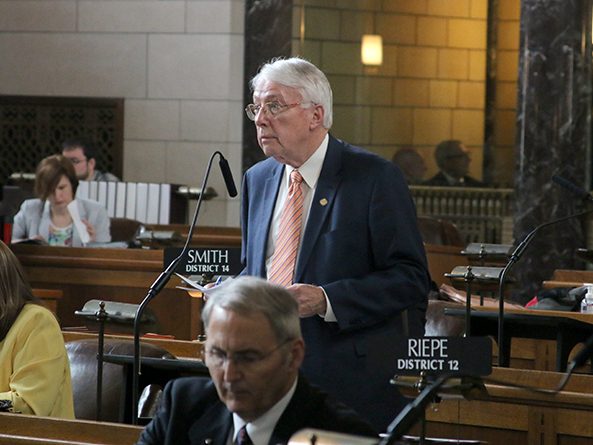Short-term disability program retained, developmental disability changes advance
A bill introduced to end Nebraska’s short-term disability program was amended May 15 to remove that provision and add others related to developmental disability services in Nebraska.

LB333 was introduced by Ralston Sen. Merv Riepe on behalf of Gov. Pete Ricketts as part of his proposed budget modification package. The bill was estimated to save approximately $7.4 million over the biennium.
“It’s not going to be easy, but it is our constitutional duty to balance the budget,” Riepe said.
Under current law, the state Department of Health and Human Services (DHHS) must perform an independent medical review of an individual’s disability if he or she is denied benefits by the federal Social Security Administration based on the duration of the disability.
An individual may then qualify for and receive short-term assistance from the State Disability Program for up to 12 months. LB333 would have eliminated the program, which currently has 16 active participants and includes medical and cash assistance.
Omaha Sen. Bob Krist expressed concern during earlier debate April 26 that elimination of the program would result in counties being responsible for the financial support of individuals with short-term disabilities.
“This will put an unfunded mandate on your counties,” he said.
During debate on May 15, Krist offered an amendment to remove the original provisions of LB333. The amendment also would make changes to a Health and Human Services Committee amendment dealing with development disability service provision.
The committee amendment, adopted 42-0, added provisions from two bills also introduced by Riepe.
Provisions from LB417 would change requirements for DHHS from coordinating quality review teams to coordinating the development and implementation of a quality management and improvement plan for individuals with developmental disabilities.
The amendment would require DHHS to develop and implement a plan to promote and monitor the quality of services and quality of life for people with developmental disabilities. The plan would rely on data gathered by independent evaluators collected from people who receive services and their families.
The plan would be delivered to the Legislature by Sept. 30, 2017, and – beginning in 2018 – annual reports regarding outcomes and improvement priorities would be provided.
Also included in the amendment were provisions of LB495, which would update definitions for developmental and intellectual disabilities and change the stated priorities for services to people with developmental disabilities in Nebraska.
Riepe said the changes would ensure that the state is in compliance with federal regulations. Currently, Nebraska has a state-funded program that prioritizes high school graduates with developmental disabilities and enrolls them into the adult day waiver immediately upon eligibility, he said.
“The current acting waiver, submitted and approved under the prior administration, does not have prioritization categories approved by CMS [Centers for Medicare and Medicaid Services],” he said. “We are out of compliance.”
Riepe said the committee amendment would clarify the state’s priorities in regard to the 2,175 individuals on the disability services wait list and make sure that they are served in a fair and consistent manner.
“[The amendment] seeks to suspend the high school graduation entitlement until 2019 and moves eligible individuals with developmental disabilities into the Medicaid adult day waiver to comply with CMS requirements until 2019 and prioritizes funding,” Riepe said.
The amendment states that the first priority for developmental disability funding would be to individuals in immediate crisis due to caregiver death, homelessness or a threat to their life and safety.
Krist said that his amendment would ensure that the entitlement for high school graduates would remain in place should the waiver ever go away.
“You need to make sure that you watch this program carefully because it affects a number of people who cannot advocate for themselves and who need these services desperately,” he said.
Bellevue Sen. Sue Crawford supported the amendment, saying day service supports for graduates with developmental disabilities are essential so that individuals are able to retain and build upon the skills they learned in high school.
“So no one falls off – no one ends up in their living room with no help and gets worse,” she said. “We heard story after story [in committee hearings] of what happens if those day services are discontinued.”
The amendment was defeated on a 23-21 vote.
Riepe then proposed adoption of an amendment, filed earlier by Krist and withdrawn, to retain the State Disability Program that would be removed by LB333, but leave the provisions of his other two bills intact.
Riepe said that changing the priority language for the developmental disability wait list would place the state’s most vulnerable individuals at risk. The committee amendment specifies that priority for the state’s wait list will be given to individuals in the greatest need, he said.
Krist supported the amendment and said that all the parties would continue to work on select file regarding the bill’s intent language related to high school graduates with developmental disabilities.
The amendment was adopted 44-0 and the bill advanced to select file on a 41-0 vote.


